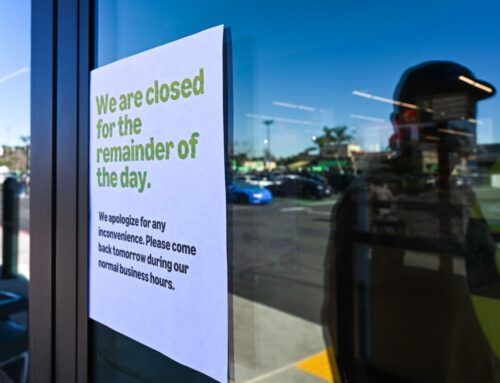Dow Jones Today: Stock Futures Tumble as China Retaliates Against Trump’s Tariffs
April 9, 2025
Watch These Apple Stock Price Levels Amid Tariff Volatility1 hr 18 min ago Apple (AAPL) shares moved higher Wednesday after losing more than a fifth of their value over the previous four sessions amid concerns about the impact of a trade war between the U.S. and China.
The recent decline, which saw Apple briefly lose its title as the world’s most valuable company, took place as investors braced for the Trump administration’s sweeping tariffs to take effect, notably a 104% levy on imports from China, where an estimated 90% of the company’s products are assembled.
Apple shares were up more than 4% at around $180 in early-afternoon trading, making it one of the top gainers in the S&P 500.
Selling in Apple shares has accelerated after the price broke down below the neckline of a head and shoulders pattern last month. More recently, the stock’s dramatic intraday reversal during Tuesday’s trading session saw the price close decisively below the closely watched 200-week moving average. Source: TradingView.com.
While the relative strength index (RSI) confirms bearish price momentum, the indicator has slipped into oversold territory, increasing the likelihood of investors seeking short-term bounce opportunities.
Investors should eye major support levels on Apple’s chart around $166, $155, and $138, while also monitoring a key overhead area near $197.
Read the full technical analysis piece here.
–Timothy Smith
Pharma Stocks Sink as Trump Says ‘Major Tariffs’ Coming2 hr 39 min ago Shares of several major pharmaceutical companies slumped Wednesday morning as President Donald Trump threatened tariffs on the industry.
Speaking at a Tuesday event hosted by the National Republican Congressional Committee, Trump said his administration will “be announcing very shortly a major tariff on pharmaceuticals” in an attempt to force companies to shift manufacturing to the U.S.
“We’re going to tariff our pharmaceuticals, and once we do that they’re going to come rushing back into our country because we’re the big market,” Trump said Tuesday. “The advantage we have over everybody is that we’re the big market. So we’re going to be announcing very shortly a major tariff on pharmaceuticals, and when they hear that, they will leave China, they will leave other places because they have to sell, most of their product is sold here.”
Shares of AstraZeneca (AZN), Pfizer (PFE), Eli Lilly (LLY), Novo Nordisk (NVO), Johnson & Johnson (JNJ), GSK (GSK), and Sanofi (SNY) all declined Wednesday morning
Pharmaceuticals were one sector exempted from the wide-ranging tariffs announced last week, along with semiconductors.
Trump has cited a desire to motivate companies to shift manufacturing back to the United States. Experts have said the rise in prices and potential recession could cause many jobs to be lost before those potential manufacturing job gains are realized, however.
–Aaron McDade
What to Watch For From Big Bank Earnings3 hr 16 min ago As U.S. banks begin reporting their quarterly earnings on Friday, investors will watch to see whether fears about tariffs are hampering clients’ borrowing appetites and ability to repay loans.
Banks’ results coming soon from the first quarter will matter, but the fallout from April 2, which President Donald Trump dubbed “Liberation Day,” may be more consequential. President Donald Trump’s tariff plans have raised recession risks and triggered sell-offs in stock markets, complicating the outlook for the banking industry.
“While banks might not be directly impacted by tariffs, they are exposed to every industry that is,” Jason Goldberg, an analyst at Barclays, wrote in a note Friday.
The latest bout of uncertainty has hammered bank stocks. The KBW Nasdaq Bank Index (BKX) is down about 18% this year through Tuesday’s close, outpacing the decline in the S&P 500 index, as investors worry that an economic downturn will make it hard for consumers and businesses to repay debts. The KBW Nasdaq index of regional banks or KRX, is off a similar amount.
The last week has “completely upended” expectations for the industry, Scott Siefers, a bank analyst at Piper Sandler, wrote on Monday.
“We doubt we’ll get all the answers we want with earnings, but at least banks will have the chance to respond to the emerging backdrop and to shape expectations,” Siefers said.
Read the full article here.
–Polo Rocha
Delta Says Growth ‘Largely Stalled’ Amid Uncertainty3 hr 47 min ago Delta Air Lines (DAL) shares rose in premarket trading Wednesday after the carrier’s fiscal first-quarter results came in better than analysts had expected.
Delta reported adjusted earnings per share (EPS) of $0.46 on operating revenue of $14.04 billion. Analysts polled by Visible Alpha had forecast $0.39 and $13.89 billion, respectively.
The airline reported passenger revenue per available seat mile of 16.78 cents and cost per available seat mile of 19.69 cents; analysts had expected Delta to lose about 2.8 cents per ASM transporting passengers. Delta and domestic rivals United Airlines (UAL), American Airlines (AAL), and Southwest Airlines (LUV) all were profitable but lost money flying passengers in 2024.
Delta said it expects second-quarter revenue to rise or decline by 2% and adjusted EPS from $1.70 to $2.30, below the $2.41 consensus. The airline said it is not affirming or updating full-year projections at this time “given current uncertainty.”
“With broad economic uncertainty around global trade, growth has largely stalled,” CEO Ed Bastian said. “In this slower-growth environment, we are protecting margins and cash flow by focusing on what we can control. This includes reducing planned capacity growth in the second half of the year to flat over last year while actively managing costs and capital expenditures.”
Analysts have said that the Trump administration’s new tariffs could push the U.S. economy into a recession, which would be a big hit to major airlines. UBS analysts on Monday wrote that they expected airlines to suspend their full-year outlooks amid tariff uncertainty, while Bank of America analysts said they think airlines will be conservative in their second quarter and full-year projections.
Delta shares rose 7% in early trading to lead S&P 500 gainers. They entered Wednesday down nearly 50% from a record-high close of $69.06 in early February.
–Aaron McDade
Apple Under Pressure Amid China Trade Spat4 hr 22 min ago Apple (AAPL) shares were down slightly in premarket trading as China retaliated against newly imposed U.S. tariffs.
The stock fell 5% on Tuesday, causing the company to lose its status as the world’s most valuable by market capitalization. Heading into today’s session, the iPhone maker has a market cap of less than $2.6 trillion, compared with software maker Microsoft’s (MSFT) $2.65 trillion.
Apple shares have lost 23% of their value in the four sessions since President Trump announced he would increase the tariff rate on Chinese goods as part of a wide-ranging plan to tax imports. After those levies went into effect overnight, China said this morning it would raise its tariff on imports from the U.S. to 84%.
Apple, which assembles an estimated 90% of its products in China, won exemptions during the first Trump administration’s U.S.-China trade war. It’s had no such luck this time around.
:max_bytes(150000):strip_icc()/AAPL_2025-04-08_18-29-57-3e0a4d30ac9149a3af462d165d78ee01.png)
Worries about the company’s reliance on China have made its stock the worst-performing of the Magnificent Seven in the last week. Tesla (TSLA), the group’s second-worst performer, has declined about 21.5% since Trump’s tariff announcement. Amazon (AMZN), Nvidia (NVDA), and Meta Platforms (META) have all declined between 12% and 13% over the same period, while Alphabet (GOOG) and Microsoft have fallen 7.7% and 7.2%, respectively.
Apple’s slump has wiped nearly $775 billion off the company’s market value. That’s more than Tesla’s market cap and greater than those of all but seven U.S. companies (including Apple itself).
S&P 500 Down 12% Since ‘Liberation Day’5 hr 10 min ago The S&P 500 and Dow Jones Industrial Average head into Wednesday’s session on four-session losing streaks.
The S&P 500 has lost 12.1% since President Trump late last Wednesday—a day he declared to be “Liberation Day”—announced his intention to impose wide-ranging tariffs on U.S. trading partners. The Dow has given up 10.8% over that four-session stretch.
The Nasdaq Composite, which managed to eke out slight gains on Monday before falling sharply Tuesday, has plunged 13.3% over the past four trading days.
:max_bytes(150000):strip_icc()/SPX_2025-04-08_18-52-52-e014792535bc46a2a6bd7c1b6bb4b83a.png)
Major Stock Indexes Futures Point to Steep Declines5 hr 49 min ago Futures tied to the Dow Jones Industrial Average were down 2.2%.
:max_bytes(150000):strip_icc()/YM1_2025-04-09_07-57-45-8cdcce1d001949deaef6b65e0f24c27d.png)
S&P 500 futures were off 2.1%.
:max_bytes(150000):strip_icc()/ES1_2025-04-09_07-57-51-9be9f7b26490484a95608af0b635dc23.png)
Nasdaq 100 futures dropped 1.9%.
:max_bytes(150000):strip_icc()/NQ1_2025-04-09_07-57-57-f37be9fe598b4807aabcdbf49411a026.png)
Search
RECENT PRESS RELEASES
Related Post




